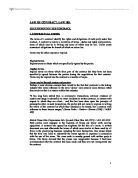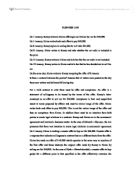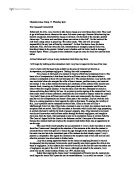The second thing to consider is whether there has been any acceptance of this offer by anyone. Julia sent a bid of £25,000 by fax to Jason accepting the offer at 5.30pm on the 23rd November. By sending her to bid by fax Julia is accepting the offer however with instantaneous communication such as sending a fax, acceptance only take place when the acceptance is received by and brought to the attention of the offeror, this was expressed by Denning LJ in the case of Entores v Miles Far East Corp. [1955] 2 QBD 327, and it is received at the place where the offeror happens to be. This comes from the case of Brinkibon Ltd v Stahag Stahl [1983] 2 AC 34. As there was no paper in the fax machine, Jason never received this bid meaning that acceptance has not taken place.
At 10am on the 23rd November Martin handed a bid of £25,000 into the store. This acceptance was communicated by his conduct, that is, he handed in the bid to the store. This was established as a valid method of acceptance in the case of Carlill v Carbolic Smoke Ball Co. [1893] 1 QB 256. This acceptance was brought to the attention of the offeror and Jason is aware of the acceptance.
David phoned Jason and left a message on his answering machine making a counter offer. A counter offer rejects the original offer and introduces new terms to the proposed contract which is then capable of acceptance or rejection. This principle is illustrated in the case of Hyde v Wrench (1840) 3 Beav 334. There is a general rule in acceptance that acceptance must be communicated to the offeror and is only validly communicated when it is brought to the intention of the offeror. David stated that if he did not hear anything from Jason he would assume he accepted the offer. However there is another rule in acceptance that acceptance of an offer will not be implied through mere silence. Also an offeror cannot impose a contractual obligation upon on offeree by stating that unless the offeree specifically rejects the offer, he will have accepted it. This was shown in the case of Felthouse v Bindley (1802) 11 CB (NS) 869. This means that Jason has not accepted the offer and is therefore not contractually bound to sell him the stock of bicycles.
In this situation the only possible acceptance of the original offer would be by Martin meaning that Jason would only be contractually bound to sell Martin the stock of bicycles for £25,000.
In addition to this Jason entered into a unilateral contract with Darren to carry out electrical work for £2,000. A unilateral contract is a contract whereby one party promises to pay the other a sum of money if that party completes a specified task. With a unilateral contract acceptance only takes place when the specified task has been fully completed. This was illustrated in the case of Carlill v Carbolic Smoke Ball Co. [1893] 1 QB 256. This means the contract is not formed until the task has been completed. Jason also makes an additional offer to pay Darren an extra £500 if he completes the task on time. Again acceptance of this additional offer will not occur until the work is completed and if only if it is completed on time. This means that Jason is not contractually bound to give Darren the additional £500 unless the work is completed and completed on time. As Darren does complete the task and on time acceptance of both offers has taken place and at this point a contract has been formed meaning Jason is bound to pay Darren £2,500.
Jason also enters into a unilateral contract with Peter to complete all plastering for £1,500. Acceptance of this offer can only be made when the task of plastering is fully completed. Again this is illustrated in the case of Carlill v Carbolic Smoke Ball Co. [1893] 1 QB 256. However before acceptance takes place, Peter asks for an additional £500 before he starts the work. Article 19 of the Vienna Convention provides that a reply to an offer which purports to be an acceptance but contains additions or other modifications is a rejection of the offer and constitutes a counter offer. Following this article Peter has made a counter offer which requires either acceptance or rejection by Jason. This counter offer may however be seen as a form of economic duress. This form of duress occurs when two parties are already in a contractual relationship when one party takes advantage of the situation and renegotiates the contract to make it more beneficial to him. In this situation, Peter and Jason had a contractual relationship and Peter stated that he would not carry out the plastering work unless Jason agrees to pay him an additional £500 thereby altering the terms of the contract to favour himself, that is he would gain more money by doing the same work. Due to this the contact would be void meaning Jason does not have to pay Peter the additional £500. This form of duress was illustrated in the case of North Ocean Shipping Co v Hyundai Construction Co (The Atlantic Baron) [1979] QB 705.
Jason did however agree to the counter offer which would normally create a binding contract. However because the agreement was obtained as a result of duress the contact would not be valid meaning that Jason would not be contractually bound to Peter.
In conclusion Jason would only be contractually bound to sell his stock of bicycles to Martin and pay £2,000 to Darren for completing all electrical work.
Text Books
-
McKendrick, P. (2005) Contract Law) 6th edition, Hampshire, Palgrave, Macmillan Law Masters, pp32 – 53, 356 – 362.
Case List
- Brinkibon Ltd v Stahag Stahl [1983] 2 AC 34
- Carlill v Carbolic Smoke Ball Co. [1893] 1 QB 256
- Entores v Miles Far East Corp. [1955] 2 QB 327
- Felthouse v Bindley (1802) 11 CB (NS) 869
- Hyde v Wrench (1840) 3 Beav 334
- North Ocean Shipping Co v Hyundai Construction Co (The Atlantic Baron) [1979] QB 705
7. Partridge v Crittenden [1968] 1 WLR 1204
Articles
- Article 19 of the Vienna Convention







